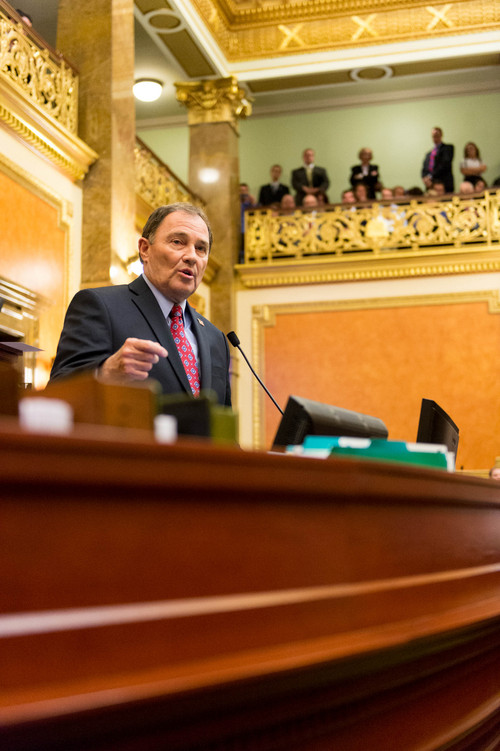This is an archived article that was published on sltrib.com in 2014, and information in the article may be outdated. It is provided only for personal research purposes and may not be reprinted.
Gov. Gary Herbert released a list Tuesday of 70 more bills from the 2014 Legislature that he signed into law. That leaves 183 awaiting his possible signature on Wednesday — the deadline for Herbert to veto bills, sign them or allow them to become law without his signature.
Several education groups have been pushing Herbert to veto SB257. It squeaked through the House on a 38-37 vote minutes before midnight on the final night of the Legislature, and would ask a panel of parent volunteers now in charge of reviewing state-test questions also to field complaints about curriculum and instructional materials.
Among groups that have asked Herbert to veto it are some members of the review panel — who say complaints should be handled at the school level — plus the Utah PTA and the state school board.
Others bills awaiting signature that saw some controversy include a bill to prohibit cities from outlawing any breed of dog, including pit bulls; one to allow elementary schools to instruct parents and kids on preventing child-sexual abuse; and legislation to allow people to keep private their contact information on voter registration rolls.
Also among bills yet to be signed are many annual appropriations measures.
A complete list of all bills that passed the 2014 Legislature, and which the governor has signed so far, is available at le.utah.gov/asp/passedbills/passedbills.asp.
Tuesday's list of 70 bills that Herbert signed includes one to help phase out wood-burning stoves to reduce air pollution; one to encourage bars to offer Breathalyzers to help prevent drunken driving; and one to allow an experiment with Election Day voter registration.
On Monday, Herbert released a separate list of 111 bills he had signed, including ones that ban "revenge porn," reform payday loans, approve moving the state prison from Draper and help prevent repeats of the Stericycle medical waste incinerator controversy.
Details of some of those bills include:
• HB154 by Rep. Patrice Arent, D-Millcreek, would offer a subsidy to roughly 200 homeowners that rely on wood-burning stoves in parts of the state with dirty air to transition to cleaner natural gas.
• HB156 by Rep. Rebecca Chavez-Houck, D-Salt Lake City, creates a pilot project through the 2016 elections to allow voters to register on Election Day in counties and cities that choose to participate. Currently, potential voters must register more than 14 days before an election in order to cast ballots.
• HB190 by Rep. Greg Hughes, R-Draper, makes it legally easier for bars to offer Breathalyzers. Hughes backed off an earlier proposal to mandate them when that became the butt of national jokes.
The new law creates some standards on calibration and quality. It ensures the privacy of people who use the machines; prevents results from being used against them in court; and prevents suing bars if a patron is later arrested for DUI after "passing" a test in a bar.
• HB71 by Rep. Marie Poulson, D-Cottonwood Heights, clearly outlaws "revenge porn," or distribution of "intimate images," such as partial nudity or sexual conduct, of adults without consent and with intent to cause emotional distress or harm.
• HB127 to reform payday loans — which average 474 percent annual interest in Utah. That industry long tried to avoid similar reform and to do it even created scandals that helped lead to the resignation of former Attorney General John Swallow.
The bill was sponsored by Rep. Jim Dunnigan, R-Taylorsville, who headed the special committee that investigated Swallow. It found that in return for big donations from payday lenders, Swallow funneled money in hard-to-trace ways to help them defeat former Rep. Brad Daw, R-Orem, who had pushed similar reform.
The bill will require lenders to give borrowers time without penalty or interest at the end of 10 weeks to pay back loans; require any lawsuits to be filed where borrowers live; and require lenders to report how many loans go the full 10 weeks allowed, how many end up in default, and the amounts involved.
• HCR8 and SB268 to declare the intent of the Legislature — and now governor — to move the aging state prison now in Draper, and create a new commission to choose a new location.
The Draper prison sits in a high-tech corridor some refer to as "Silicon Slopes" and is eyed as a potentially lucrative site for new development.
• SB196 by Sen. Todd Weiler, R-Woods Cross, to prevent future medical waste incinerators from being located within two miles of residential areas — hoping to avoid the kind of problems that have plagued Stericycle in North Salt Lake.



